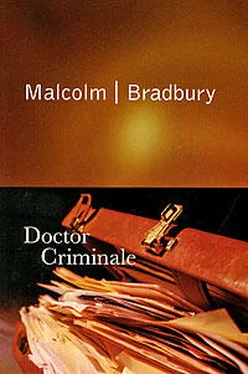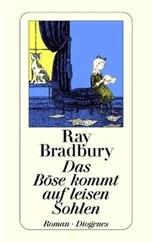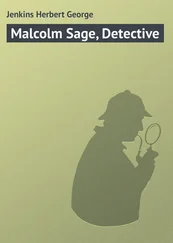Malcolm Bradbury - Doctor Criminale
Здесь есть возможность читать онлайн «Malcolm Bradbury - Doctor Criminale» весь текст электронной книги совершенно бесплатно (целиком полную версию без сокращений). В некоторых случаях можно слушать аудио, скачать через торрент в формате fb2 и присутствует краткое содержание. Город: London, Год выпуска: 2000, ISBN: 2000, Издательство: Picador, Жанр: Современная проза, на английском языке. Описание произведения, (предисловие) а так же отзывы посетителей доступны на портале библиотеки ЛибКат.
- Название:Doctor Criminale
- Автор:
- Издательство:Picador
- Жанр:
- Год:2000
- Город:London
- ISBN:978-0330390347
- Рейтинг книги:5 / 5. Голосов: 1
-
Избранное:Добавить в избранное
- Отзывы:
-
Ваша оценка:
- 100
- 1
- 2
- 3
- 4
- 5
Doctor Criminale: краткое содержание, описание и аннотация
Предлагаем к чтению аннотацию, описание, краткое содержание или предисловие (зависит от того, что написал сам автор книги «Doctor Criminale»). Если вы не нашли необходимую информацию о книге — напишите в комментариях, мы постараемся отыскать её.
Doctor Criminale — читать онлайн бесплатно полную книгу (весь текст) целиком
Ниже представлен текст книги, разбитый по страницам. Система сохранения места последней прочитанной страницы, позволяет с удобством читать онлайн бесплатно книгу «Doctor Criminale», без необходимости каждый раз заново искать на чём Вы остановились. Поставьте закладку, и сможете в любой момент перейти на страницу, на которой закончили чтение.
Интервал:
Закладка:
By now, you could very well be wondering (of course you could equally well not) about me: my life, my literary attitudes, even my Weltanschauung in general. I could detain you with some random biography (parents, school, sporting interests, first fumbling love-makings), but I really prefer not to. Briefly, then, in the Mid-Eighties, that mysterious and now totally lost decade, I was an undergraduate at the University of Sussex, the Sixties-by-the-Sea. Here I was smart as a button, and here I acquired my literary education. It was the Age of Deconstruction, and how, there on the green Sussex chalk downs, we deconstructed. Junior interrogators, literary commissars, we deconstructed everything: author, text, reader, language, discourse, life itself. No task was too small, no piece of writing below suspicion. We demythologized, we demystified. We dehegemonized, we decanonized. We dephallicized, we depatriarchalized; we decoded, we de-canted, we de-famed, we de-manned. When the course reached its end, I went to my tutor – a young but sad, bedraggled late-Marxist figure, drained of nearly all life by the academic dismantlings of the Thatcher Age – and said I had made my choice of career. Was it, he asked ironically, banking, accountancy, the Jaw, a Harvard MBA, a course in creative writing at some even more distinguished new university? No, I said, like several of my friends, I wanted to join the army. After all, there would be no war, and I thought nothing could be more amusing than spending the rest of my days sitting drinking beer in Bavaria.
He went, I recall, white, and stared at me in obvious historical dismay. This wasn’t the Sussex he thought he knew so well. But then his always sharp wits gathered, and he gave me a piece of advice I recall to this day, this very day. If, he said, it was random violence I was after, why not go into literary journalism? I told him that, having taken his course, I no longer liked writers or their work. He had proved to me conclusively that all literature had been written by the wrong people, of the wrong class, race and gender, for entirely the wrong reasons. Marvellous, he said; for a career on the modern book pages these were perfect qualifications. Then, reaching for the telephone on his desk, he dialled some freephone number and talked to one of his many journalist friends. So well did he sing my praises that within days I had been offered trial employment on a forthcoming Serious Sunday newspaper, which was seeking a fresh, youthful, irreverent but upmarket image. And I still recall the day at the final party for our class when, tears in his eyes, Sancerre in his glass, my tutor shook my hand for the last time, and urged me to go out into the world and do good hermeneutic work in the service of personkind. From that day until the night of the Booker, I’d dedicated my career to the high principles he taught.
My Serious Sunday was one of those neo-tabloids that are produced from computerized offices in cabriole-topped postmodern tower blocks just to the south of the Thames. Its sharp vital pages were made up of politics and sex, high finance and consumption, opera and custom number plates, country living and rap, intellect and gossip, thought and sneer, in such perfect combination as to make every sabbath a day of ideal leisure and pleasure. Among discriminating readers (and as we told our advertisers, we only had discriminating readers, like yourselves), my literary pieces – original, intellectual, radical, anarchical, topical, and above all oedipal – soon made their mark. Like my fellow New Age journalists who only profile well-known people they totally despise, I caught the note of the day to perfection. I wrote for the Nineties person: neat but alternative, streetwise but eco-friendly, book-aware but never dull. People called me a Punk Reviewer, though why my thoughtful columns should be compared to a kind of backstreet garage music I would never give CD time to I cannot understand.
So I made my way, the aspiring journo in the age of literary confusion. I did, I think, all the right things. I took a flat in Camden (Islington) in a basement so modest it was actually underneath another basement. I lived off fast-food outlets and bought myself a microwave oven and a mountain bike. I had girl-friends who wanted to take out joint mortgages on Docklands apartments with me; I explained I want to remain a person of temporariness not permanence, journey not arrival. I wrote, but not books (far too monumental). I wrote fragments, in fact I wrote everything: solemn pieces for the Times Literary Supplement , essays on South American fiction for the London Review of Books , lyrics for pop songs, scripts for radio commercials. I reviewed and I columnized, picking up titbits about authors that would make your ears crinkle. I interviewed, I opined. I freelanced, I free-styled, I free-loaded, I freebied. I also worked part-time in a winebar in Covent Garden, and sold gossip to New Musical Express . And so I made my way, till the night of the Booker, when my life quite seriously changed.
By now, back in our mise-en-scène at the Guildhall, the room was full of folk and noise. An MC appeared, gaveiled for silence, and asked us all to proceed into the Banqueting Hall beyond. In a great restive flock the authors round me surged off, herded here and there by their various Fionas. I jostled my way through the elegant diners pushing for the trough to find the table plan, to see what good company had been picked for me in the prime part of the evening. I saw I had not been placed on the top table, where all the places had been assigned to people somewhat better known than myself: an ex-Prime Minister, the leader of the opposition, two Nobel prizewinners, a French new novelist, now very old, and the chairman of thejudges, a former Labour politician rumoured to read books. Nor, for that matter, was I on any of the other tables either. ‘I hope you don’t think they’ll let you eat with the big people,’ said someone at my side, taking the spare glass of champagne from my hand, ‘There’s a press-room at the back where you can eat your sandwiches. If you remembered to bring them.’ I turned, and there was the girl in the thong-tied dress again, cuddling her clipboard and very frankly looking me over.
‘Ah, it’s you,’ I said. ‘And it’s also you,’ she said. ‘You know who I am,’ I said, ‘I don’t know who . . .’ ‘I’m Ros,’ said the girl, ‘Short for Diana.’ ‘How did you like the interview?’ I asked. ‘Brilliant,’ she said. ‘I was good?’ I asked. ‘You were terrible,’ she said, ‘Worse than Howard Jacobson.’ ‘Come on, nobody at the Booker’s ever been worse than Howard Jacobson,’ I said. ‘They have now,’ she said. ‘Okay, what was wrong with it?’ I asked. ‘You were mean, crappy and selfish,’ said Ros. ‘Well, I’m young,’ I said. ‘I’ll say,’ said Ros, ‘Do you want to come to the scanner and watch it go out?’ ‘Go out?’ I asked, ‘You mean it’s bad but you’re still going to use it?’ ‘I mean it’s so bad we’d be crazy not to use it,’ said Ros. ‘Now look,’ I said, ‘If it’s bad we ought to think about this.’ ‘We have,’ she said, ‘It’s right at the top of the programme. It’s so bad it’s brilliant. You’d love it, at least you would if it weren’t you. Are you coming or not? If so, grab one of those champagne bottles from the waitress, before she takes them away.’
So Ros and I stepped out of the Guildhall, leaving behind the bright lights and the glitz of the great and the good, and started walking in wind and driving rain through the City of London, its great financial towers, the pride of the economic Eighties, rising high above. We walked through the land of fiscal wizardry, turned down a mean sidestreet, and entered an unmarked green van, parked in shadow at the end of a dirty alley. Above rose the great bank office blocks, where in vast galleries money-shufflers sat before computer screens, scanning the datasphere for those pulses that construct the mad fiction of economic reality. Meantime, in the scanner van down below, we did much the same, sitting before a bank of monitors selecting the images that construct the mad economic reality of fiction. And that was how, sitting in an old van in a dirty alley, I stared at a TV screen and watched the Booker Prize for Fiction, just as I might have done at home. Except at home I would not have had a thong-tied girl squeezed next to me one side, a sound engineer on the other, all of us trying to sit on one chair and drink from the same bottle of champagne.
Читать дальшеИнтервал:
Закладка:
Похожие книги на «Doctor Criminale»
Представляем Вашему вниманию похожие книги на «Doctor Criminale» списком для выбора. Мы отобрали схожую по названию и смыслу литературу в надежде предоставить читателям больше вариантов отыскать новые, интересные, ещё непрочитанные произведения.
Обсуждение, отзывы о книге «Doctor Criminale» и просто собственные мнения читателей. Оставьте ваши комментарии, напишите, что Вы думаете о произведении, его смысле или главных героях. Укажите что конкретно понравилось, а что нет, и почему Вы так считаете.











